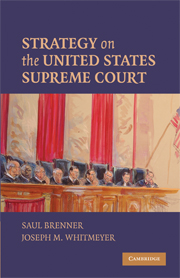Book contents
- Frontmatter
- Contents
- Preface
- PART I INTRODUCTION
- PART II CERTIORARI
- PART III THE CONFERENCE VOTE ON THE MERITS
- PART IV THE MAJORITY OPINION AND OTHER OPINIONS
- 8 The Extent of Successful Bargaining over the Content of the Majority Opinion
- 9 The Size of Opinion Coalitions
- 10 At Whose Ideal Point Will the Majority Opinion Be Written?
- 11 Reciprocity on the Supreme Court
- PART V THE FINAL VOTE ON THE MERITS
- PART VI CONCLUDING CHAPTERS
- Appendix 1 Decision Making on the United States Supreme Court
- Appendix 2 Additional Questions to Explore
- References
- Table of Cases
- Index
11 - Reciprocity on the Supreme Court
Published online by Cambridge University Press: 05 June 2012
- Frontmatter
- Contents
- Preface
- PART I INTRODUCTION
- PART II CERTIORARI
- PART III THE CONFERENCE VOTE ON THE MERITS
- PART IV THE MAJORITY OPINION AND OTHER OPINIONS
- 8 The Extent of Successful Bargaining over the Content of the Majority Opinion
- 9 The Size of Opinion Coalitions
- 10 At Whose Ideal Point Will the Majority Opinion Be Written?
- 11 Reciprocity on the Supreme Court
- PART V THE FINAL VOTE ON THE MERITS
- PART VI CONCLUDING CHAPTERS
- Appendix 1 Decision Making on the United States Supreme Court
- Appendix 2 Additional Questions to Explore
- References
- Table of Cases
- Index
Summary
Do the justices exchange votes or join each other's opinions? In groups like the United States Supreme Court – that are small and repeatedly engage in collective decision making – such an exchange is likely to be a beneficial strategy for all the actors. It certainly could make sense for the Supreme Court justices. Suppose that, contrary to her personal preferences, Justice A votes with other justices on some cases about which she cares less, and the other justices vote with her on some cases about which they care less. All the justices ought to end up more satisfied. Such an exchange, however, will violate the ideal of justice, according to which the outcome of each case ought to depend on its own merits. The justices who aspire to this ideal, therefore, may refuse to engage in such an exchange. In this regard, Justice Breyer (Toobin, 2005) stated:
Tomorrow is another day. No dependency of a decision of one case on another. You join me, I join you. None of that. None of that, zero. The coalitions float. Each one, one case, is a new day. Each day is a new day.
We agree that justices do not exchange votes on cases in such a way as to affect the decisions in the cases, but the justices still may join one another's opinions reciprocally or they may leave minorities and join majorities reciprocally. We focus on these two possibilities in the remainder of this chapter.
- Type
- Chapter
- Information
- Strategy on the United States Supreme Court , pp. 103 - 112Publisher: Cambridge University PressPrint publication year: 2009



